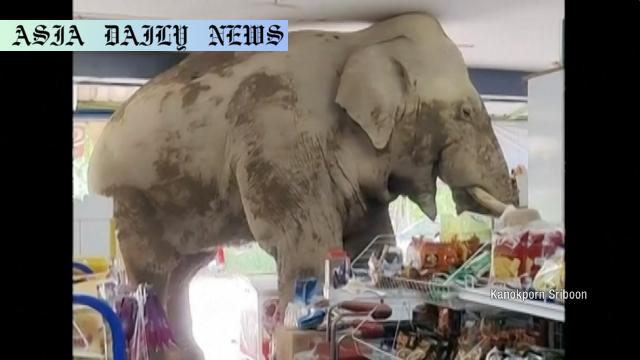elephant wanders into a Thai store, eating snacks worth $25. With no major damage, park rangers safely escorted him back to the wild.
A wild elephant ventured into a Thai grocery store for food.
The elephant ate snacks worth $25 before leaving safely.
Park rangers ensured the situation ended without damage.

An Unexpected Visitor
In a captivating yet startling incident, Plai Biang Lek, a wild elephant familiar to locals, wandered into a grocery store in central Thailand in search of food. While such events aren’t unheard of in the region, this marked the first time the elephant was seen exploring a store. Hailing from a nearby national park north of Bangkok, his unannounced visit surprised many and highlighted a recurring issue in areas where wildlife habitats are shrinking.
The Elephant’s Feast
During his brief 10-minute shopping spree, Plai Biang Lek consumed nine bags of sweet rice crackers, a sandwich, and several bananas from the store shelves. The total estimated cost of the feast amounted to approximately $25. Highlighting his sheer size and the urgency of hunger, the event left the store owner and customers both intrigued and amused. Though no significant damage was reported, the visit underscores the increasing presence of wildlife in human-populated areas.
Habitats Under Pressure
Thailand is home to thousands of wild elephants, many of whom reside in protected national parks or forest reserves. However, human activity, including deforestation, urban expansion, and agricultural development, has significantly reduced their natural habitat. In their search for food and shelter, elephants often stray into nearby villages and towns, leading to interactions like this one. Though largely non-aggressive, such events can sometimes escalate if mismanaged or misunderstood.
Efforts to Coexist
Thanks to the swift response of park rangers, Plai Biang Lek was safely escorted back to his natural habitat without incident. This incident serves as a reminder of the delicate balance between wildlife and humans. Conservationists continue to advocate for measures such as habitat restoration, wildlife corridors, and community education to prevent such encounters in the future. These efforts aim to ensure the survival of Thailand’s elephant population while minimizing disruption to human life.
A Lesson for the Future
Incidents like these highlight the importance of understanding and respecting wildlife behavior. While Plai Biang Lek’s visit may have been entertaining, it also underscores the challenges animals face due to shrinking habitats and climate change. Moving forward, fostering coexistence will require collaboration between local authorities, conservation groups, and communities to ensure the safety and well-being of both humans and wildlife alike.



Commentary
Balancing Wildlife and Human Interaction
The story of Plai Biang Lek, the wandering elephant, brings to light the challenges of human and wildlife coexistence. While the incident might have been amusing to some, it also raises significant environmental and conservation concerns. Encounters like these are becoming increasingly common as animals grapple with shrinking habitats. It serves as a stark reminder of the broader impact of human activities on the environment.
The Need for Habitat Restoration
One of the critical reasons behind incidents like these is habitat loss. Elephants, being large and highly mobile creatures, require vast spaces to forage and roam. As their natural spaces diminish due to deforestation and urbanization, their desperation pushes them into human territories. Efforts to restore wildlife habitats and create secure corridors can go a long way in addressing this issue. Governments and communities must collaborate to prioritize such conservation initiatives.
Fostering Coexistence
While conservation projects are essential, fostering a culture of coexistence is equally critical. Communities living near national parks or forest reserves must be educated about wildlife behavior and equipped with strategies to handle such interactions. In the case of Plai Biang Lek, the park rangers’ swift action ensured no harm came to either the elephant or the inhabitants. Such approaches can be modeled and replicated in other regions facing similar challenges.
A Reminder of Shared Responsibility
Ultimately, incidents like these should remind us of our responsibility towards the environment and the creatures we share it with. While Plai Biang Lek’s grocery store visit may appear humorous on the surface, it underscores a deeper issue that requires attention. Through collective efforts and sustainable practices, we can hope to create a future where humans and wildlife not only coexist but thrive in harmony.